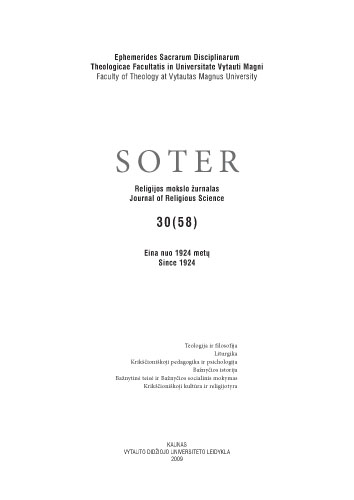Taikymo funkcija H. G. Gadamerio filosofinėje hermeneutikoje: pažinimo normatyvumas
FUNCTION OF APPLICATION IN H. G. GADAMER’S PHILOSOPHICAL HERMENEUTICS: NORMATIVITY OF COGNITION
Author(s): Milda PaulikaitėSubject(s): Christian Theology and Religion
Published by: Vytauto Didžiojo Universitetas
Keywords: hermeneutika; modernioji epistemologija; normatyvumas; kognityvumas; mokslas; moralė; Gadameris; hermeneutics; modern epistemology; normativity; cognitivity; science; morality; Gadamer
Summary/Abstract: H.-G. Gadamer explores influence of natural sciences on methodology of humanities and their social status. According to him, classical natural sciences impose on all other kinds of cognition modern conception of the nature of cognition that is claimed to be the only “scientific” method together with all methodological requirements that are inherent to all natural sciences and authority of cognitive standard. However the modern natural science with all its methodology is theoretical model of only one kind of cognition. All the time simultaneously the other kinds of cognition have always existed: humanities, arts and religion, - the ones that for many people are much more significant than natural science in their real, human everyday life. Gadamer does not agree with the superiority that is given to natural sciences. First of all, according to his opinion, humanities in their nature differ in essence from the natural sciences; accordingly they cannot follow their method. Therefore Gadamer analyses humanities and peculiar humanitarian understanding that is specifically inherent to them, and pursues the liberation of humanities from oppression of cognition of modern science. Having revealed hermeneutical understanding that is characteristic to humanities, having defended the rights of humanities to the equivalent co-existence beside natural science, Gadamer transfers his discussion to the universal topic of cognition itself. The main object of the investigation in the article is the essential components of hermeneutical understanding - unique normativity of hermeneutical understanding, that newly thematizes cognitivity that is essential to any human cognition together with their mutual relationship. Adequacy of evaluation of the role that aspect of normativity plays not only in Gadamer's hermeneutical understanding but also in the conception of all human thinking in general both with its consequences to any epistemological theory have been chosen to be the main problem of investigation. The main aim of the article is to reveal the influence of normativity to hermeneutical understanding and describe the most important aspects of the transformation that traditional conception of human cognition in general undergoes. Analysis is directed at discernment of those separate elements of hermeneutical understanding, description and discussion of their mutual relationship. The first part of the article is dedicated to the consideration of normativity of hermeneutical cognition. Phenomenon of human understanding is not indiscrete, one can distinguish several aspects of understanding - cognitivity, normativity and reproductivity - that are substantive, different with their functions and equivalent in their significance. Classical, modern epistemology that is based on experience of natural sciences confines to the cognitivity of human cognition. It renders to normativity the role of extraneous function of production that does not have any influence on the proc
Journal: SOTER: religijos mokslo žurnalas
- Issue Year: 58/2009
- Issue No: 30
- Page Range: 25-36
- Page Count: 12
- Language: Lithuanian

